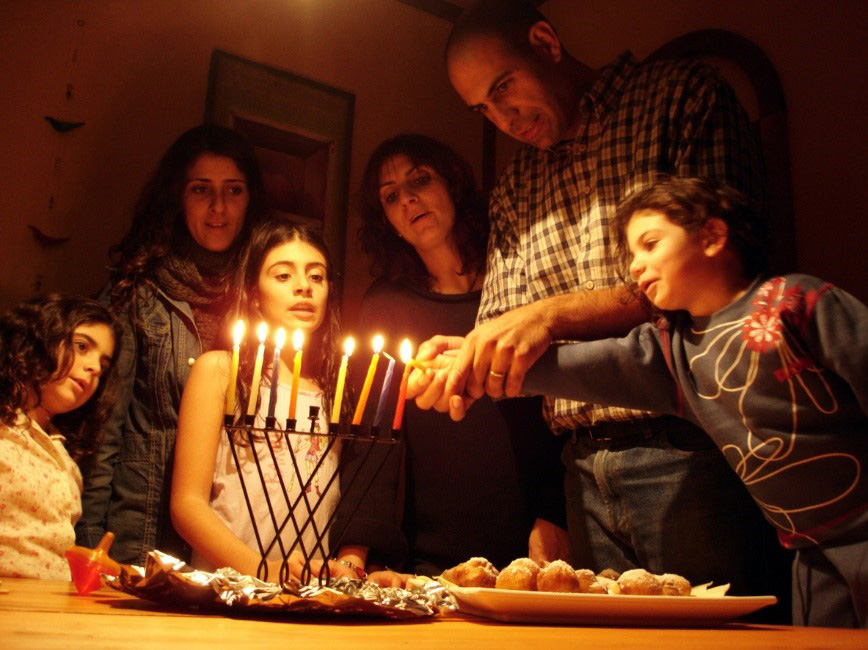
“Should we, um, you know, do Christmas?” I asked my wife tentatively in December, shortly after we’d celebrated Hanukkah. I didn’t really want to celebrate Christmas, which is mainly a commercial affair here in the UK, but since our older daughter was now four and understanding a lot more about religion and traditions, I was feeling a bit guilty about not honouring my wife’s background.
Luckily, my wife looked at me in bewilderment and answered with a firm, “No!” She reminded me that our daughter had already recognised and learned about Christmas in various ways: she had been in her school’s nativity play, had designed a Christmas card, sung Christmas songs, made a bauble, and more. Christmas – and Christianity – was all around her.
We didn’t celebrate Christmas in the end and I’m grateful that we have an easygoing multifaith household but that doesn’t mean that we ignore Christianity. I was raised in a lax Jewish environment – or maybe I should say a “lox” Jewish environment, given my family’s emphasis on the food side of Judaism – while my wife was a devoted Church of England attender for much of her childhood. Christianity had meant a lot to her and although she doesn’t identify as religiously Christian now, it is her background, and we want to find ways to teach our children about both faiths.
So although our children are still young, here is what we have been doing so far:
Talking Through Things
First of all, in my experience, the most important thing is talking. We try to explain, in age-appropriate ways, about different religions, as well as about their cultural aspects. Our older daughter understands that one of her grandmas attends a church while the other goes to a synagogue and she has a certain level of comprehension about what the difference entails. She is also aware that some of her other friends come from different religious backgrounds, such as Hindu, and we try to discuss what that means. As our girls get older, we will be able to have even more in-depth conversations about religion, culture, traditions, and beliefs.
Reading Books
Related to talking is, of course, reading. We own a variety of books about Jewish holidays and beliefs (thanks, in part, to PJ Library), and our older child enjoys those. We also try to read books that feature characters from other backgrounds so that these become normalised for our children. We want our girls to respect all religions and cultures and to treat all people equally.
Family Outtings
We also try to make appropriate visits or field trips where possible, which helps bring to life what might otherwise seem like rather abstruse ideas. Museums and places of worship are great destinations; for example, recently we went to the Anglican cathedral in our city, and my wife was able to explain about what we were seeing, such as the organ, the font, chalices, statues, graves, and so forth. Instead of merely talking about going to church, our daughter got to experience it. Even better, the cathedral happened to be featuring an exhibit on Judaism, so we saw inter-faith respect and dialogue in action.
Celebrating
And finally, celebrations will be useful for teaching our children about religious traditions, and holidays can be celebrated on their own, jointly with another event, or, well, with someone else’s family or in school. Yes, we are firmly against the commercialism of Christmas, but it is a big one in the Christian calendar, so we might dabble in that holiday when our children are older, so that they can gain a better understanding of what Christianity is about. And sometimes we might combine holidays. For instance, it will be pretty easy to explore Passover and Easter together, since the latter depends on the former and they take place at the same time of year. And since we hope our children will celebrate other holidays with friends from different backgrounds, we are glad their school is multicultural. Our older daughter is already learning about various religious and cultural traditions; for instance, she made a Diwali lamp this year in school and went to a friend’s Chinese New Year party.
For us, the keys to a multifaith family and society are respect, curiosity, and openness.
As we drove through our neighbourhood in December, our older daughter noted, “Lots of people have Christmas lights because they’re Christian. We’re not, though Mummy was when she was little. Now she’s Christian and Jewish.” We went home and lit the menorah, and found that lights for Christmas and lights for Hanukkah didn’t seem so different.
About the Author
B.J. Epstein is a senior lecturer in literature at the University of East Anglia and also a writer, editor, and Swedish-to-English translator. She lives with her wife and their two children in Norwich.
March 10, 2019